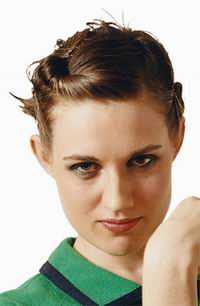What you hear on the debut release is Butterfly throughout - aside from a bit of cello and some drum tracks on "Can You See the Lights?", "Never Let It Go", and "Soulback", which were tracked live while she answered on bass - she played every instrument on the album and arranged it from start to finish. It was the same demos that she brought to Interscope for her initial meetings that became the versions of the songs that eventually graced her album. The credits you see for co-producing simply acknowledge the trusted ears and opinions of her close musical allies, Robin Eaton (sage), and Brad Jones (co-producer/engineer).
Butterfly's story began with a bit of divine intervention. She was born the middle child of seven daughters to free-spirited, creatively-endowed, and very spiritual parents. Accordingly, her mother left the naming of her children to a higher power. Her older sister Sunshine was named for the light that streamed into the nursery on the morning of her birth. In Butterfly's case, her name was originally suggested by family friends, one of them a professional clown. Her mother wasn't taken with the name Butterfly and looked again for divine confirmation that this was a good way to go.
Within the week, she had seen her first indicator: a lone picture of a butterfly hung in an elementary school hall, drawn by a child. Later that week, at dance class, she discovered her teacher dressed in a butterfly leotard. Finally, by week's end, her daughter Rebecca came home with a recording of a song called "The Butterfly Song"
Butterfly's father was a freewheeling musician, who once had the privilege of supporting AC/DC on stage on his home turf in Australia. He found himself one day with an opportunity to audition for an American publishing deal.
When that fell through, her father gave away the family's entire possessions - again with divine inspiration - and traveled the Outback with kids in tow, all piled into a Toyota Corolla wagon. Butterfly was six. She says she first learned to read by watching the signs go by on the side of the road.
That restless, wandering spirit remained with Butterfly as she grew. Her first real experiments with music were crucial to what would come later. Using a four track recorder at age 10, she would create instrumental tracks by playing every instrument since most of her friends were outside doing the things that most kids her age were supposed to be doing. Her older sister had a band of her own: The Mercy Bell. Butterfly would eventually join her as bass player and backing vocalist and share part of the writing ("Another White Dash" is a refugee song from that project). A protracted three-year demo deal with another US record label only lead to dashed hopes.
Soon after, Butterfly headed out to Europe with her brothers and sisters to look after their youngsters on the road while they toured and performed in their own 'street theatre'. During this time she visited some of the most beautiful cities on the continent where she experienced a wealth of exciting cultures and people. Following her return, a friend named Mike Dixon encouraged her to explore a solo career. It was advice she took to heart. With all the money she had she bought a laptop and moved to Stockton in the North of England to stay with family and friends. While there, she concentrated on simplifying her songs. Previously, she had always tried to cram 5 or 6 ideas into a song, and decided instead to try limiting them to 2 or 3 ideas. Soon after, attention for her solo work started to come. Positive response inspired her to continue writing and recording on her own. She felt she was finally beginning to get the songs out of her notebook and into people's heads. "I wanted to inspire more people", she says now. From there, Dixon hooked her up with several contacts, including producer duo Robin Eaton and Brad Jones who eventually took Butterfly into the studio to begin the long road toward making her debut album.
In the end, scores of instruments found their way onto the master tapes: guitars, drums, bass, piano, vibes, organ, mellotron, toy piano (on "Soul Back"), Field Organ, banjo, and various percussion (including planks of wood, a tympani, a steel wheel, and a hammer (on "Busy").
Butterfly is immediate, melodic and altogether memorable and her songs examine the often overlooked details of life's rich pageantry. Flutterby from Butterfly Boucher. Don't let it pass you by.
